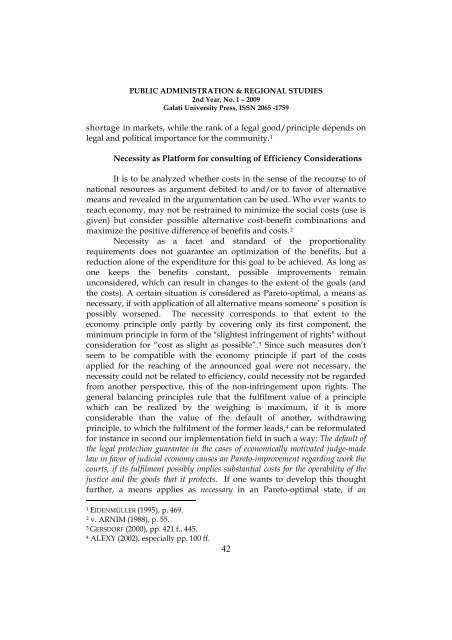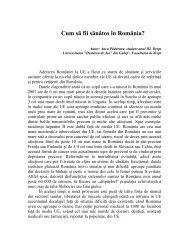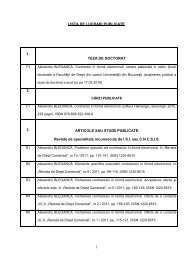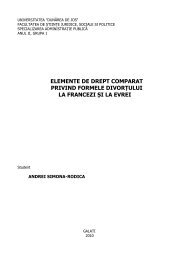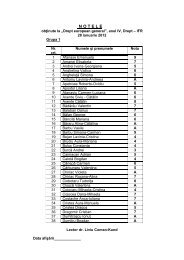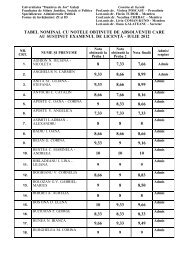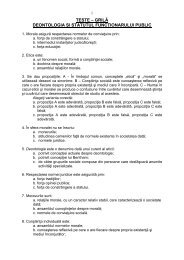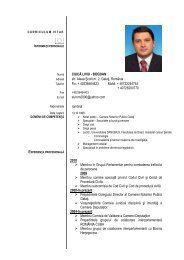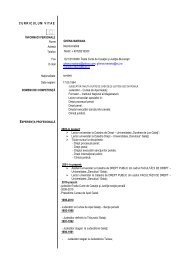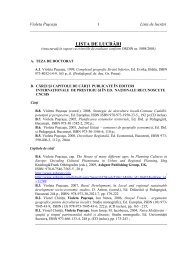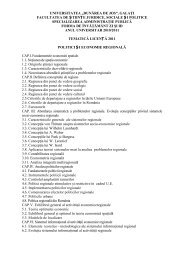regional studies public administration - Facultatea de Drept ...
regional studies public administration - Facultatea de Drept ...
regional studies public administration - Facultatea de Drept ...
Create successful ePaper yourself
Turn your PDF publications into a flip-book with our unique Google optimized e-Paper software.
PUBLIC ADMINISTRATION & REGIONAL STUDIES<br />
2nd Year, No. 1 – 2009<br />
Galati University Press, ISSN 2065 -1759<br />
shortage in markets, while the rank of a legal good/principle <strong>de</strong>pends on<br />
legal and political importance for the community. 1<br />
Necessity as Platform for consulting of Efficiency Consi<strong>de</strong>rations<br />
It is to be analyzed whether costs in the sense of the recourse to of<br />
national resources as argument <strong>de</strong>bited to and/or to favor of alternative<br />
means and revealed in the argumentation can be used. Who ever wants to<br />
reach economy, may not be restrained to minimize the social costs (use is<br />
given) but consi<strong>de</strong>r possible alternative cost-benefit combinations and<br />
maximize the positive difference of benefits and costs. 2<br />
Necessity as a facet and standard of the proportionality<br />
requirements does not guarantee an optimization of the benefits, but a<br />
reduction alone of the expenditure for this goal to be achieved. As long as<br />
one keeps the benefits constant, possible improvements remain<br />
unconsi<strong>de</strong>red, which can result in changes to the extent of the goals (and<br />
the costs). A certain situation is consi<strong>de</strong>red as Pareto-optimal, a means as<br />
necessary, if with application of all alternative means someone’ s position is<br />
possibly worsened. The necessity corresponds to that extent to the<br />
economy principle only partly by covering only its first component, the<br />
minimum principle in form of the "slightest infringement of rights" without<br />
consi<strong>de</strong>ration for “cost as slight as possible”. 3 Since such measures don’t<br />
seem to be compatible with the economy principle if part of the costs<br />
applied for the reaching of the announced goal were not necessary, the<br />
necessity could not be related to efficiency, could necessity not be regar<strong>de</strong>d<br />
from another perspective, this of the non-infringement upon rights. The<br />
general balancing principles rule that the fulfilment value of a principle<br />
which can be realized by the weighing is maximum, if it is more<br />
consi<strong>de</strong>rable than the value of the <strong>de</strong>fault of another, withdrawing<br />
principle, to which the fulfilment of the former leads, 4 can be reformulated<br />
for instance in second our implementation field in such a way: The <strong>de</strong>fault of<br />
the legal protection guarantee in the cases of economically motivated judge-ma<strong>de</strong><br />
law in favor of judicial economy causes an Pareto-improvement regarding work the<br />
courts, if its fulfilment possibly implies substantial costs for the operability of the<br />
justice and the goods that it protects. If one wants to <strong>de</strong>velop this thought<br />
further, a means applies as necessary in an Pareto-optimal state, if an<br />
1 EIDENMÜLLER (1995), p. 469.<br />
2 v. ARNIM (1988), p. 55.<br />
3 GERSDORF (2000), pp. 421 f., 445.<br />
4 ALEXY (2002), especially pp. 100 ff.<br />
42


